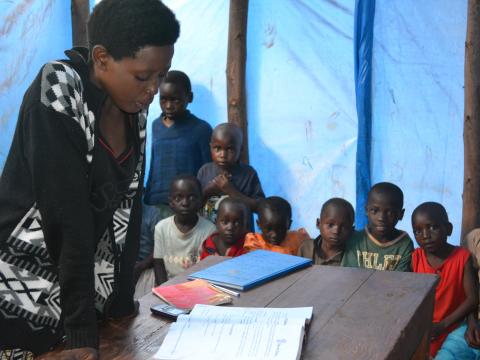Keeping children at school

At the bottom of Ngayane Hill in Ntunda, Karusi province, northeastern Burundi, children used to spend all their evenings playing. This situation recently changed, besides playing, part of their evening time is dedicated to learning how to read and write. Thanks to World Vision’s reading to learn project. A reading camp established in 10-year-old Emelyne’s area is helping her to perform well in class.
“In the last second term, I came up 4th of my class while in the first, I was the 12th”, she says. “The situation changed when I joined this reading camp”; she delightfully shares.
Poor performance is at the basis of increased rates of primary students who drop out of school, especially in the last term of the school year. Local school education authorities in Gitaramuka commune say to have noticed that most of the children who drop out are those whose records are not good.
For the only second term, 721 out of 17183 students dropped out of school, in the only commune of Gitaramuka. The main cause being bad results as explained by communal local education authorities.
“I want to be a teacher when I graduate”, Emelyne says.
Emelyne’s dream might not be a reality if more efforts are not deployed, many factors are preventing students from performing well, including lack of teaching materials, congestion of classes, and lack of qualified teachers. All these prevent school children from learning appropriately, and low scores lead them to discouragement and abandonment of school.
Parents are aware of all these challenges and are working with World Vision to change this situation. Every means is welcome including writing on walls of their homes, crop leaves and any other tool found in their environment. At Emelyne’s reading camp, children are using a tent that was donated by World Vision for nutrition rehabilitation site (FARN). The site is now serving two purposes, education and nutrition programs.
To expose more children on learning environment, World Vision’s reading to learn project trained parents so that they can help their children learn even at home. Therefore, Gloriose, Emelyne’s mother always takes time to inquire about what her daughter studied at school and help her reinforce her classes.
“I wish my children went far in studies more than I did as there is no bright future for them without studying”, she says.
World Vision facilitators to help mom to see her dream turned into reality they focus their teachings on reading and writing in children’s mother tongue. This helps children to understand what they are taught at school and hence perform well; what prevent them from dropping out of school; Desire, one of the World Vision facilitators explains.
The teaching methodology initiated by World Vision enables them to teach children of different ages at the same time. Pre-school kids are also welcome to join; he adds.
However, one issue remains, since the reading camp was established in the area, a big number of children requests to join when there is no enough room for all.
“This room is too small;” Desire says.
Since the reading camps were implanted in Ngayane Hill, the attendance rate is high. Three reading camps are operational with around 180 children.
Improving the learning conditions and capacity building for facilitators are the things World Vision and community members are working on to give more hope to Emelyne and her friends to fulfill their dreams and then address the issue of school dropout.
Story by Javan Niyakire, WVB Communications Officer